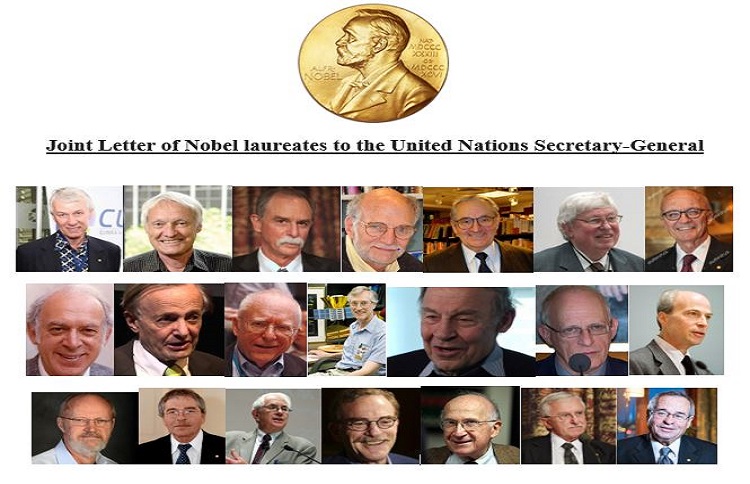
By Jubin Katiraie
Twenty-one Nobel Laureates have written to the United Nations’ Secretary-General Antonio Guterres regarding the Iranian authorities‘ concealment of the coronavirus (COVID-19) outbreak there, which has killed thousands of Iranians.
They wrote: “There are various reports that indicate that the clerical dictatorship ruling Iran has engaged in a cover-up, preventing the free flow of crucial information about the spread of coronavirus in that country. It covered up the truth in support of its political motives and agenda, including its intention to draw as many people out as possible so they attend its sham parliamentary elections and the anniversary of the 1979 revolution, which included street marches. As a result of the regime’s inaction, there has been a serious lack of preventive measures to control and ward off the spread of the novel coronavirus in Iran. For example, according to experts, the initial epicenter of the virus outbreak, the central city of Qom, was not quarantined, due to the regime’s parochial political considerations.”
In the letter, the Nobel Laureates from the US, Canada, Germany, and Norway describe this as a crime against humanity, citing reports from the People’s Mojahedin Organization of Iran (PMOI/MEK) that, as of the date of their letter, over 6,500 Iranians have died from the virus. (This has now risen to 9,600.) They said that the authorities’ coronavirus burial pits are so vast that they are “visible from space”.
They wrote: “While expressing our sympathy with the people of Iran, we express our sincere gratitude for the round-the-clock efforts of Iranian doctors, nurses, and medical staff. They are providing care to patients despite significant challenges. Sadly, some have lost their lives after contracting the virus themselves while caring for patients…. We request that, with the help of the international community, all of the medical resources and treatment be taken out of [the Islamic Revolutionary Guard Corps] IRGC’s control and instead be allocated to treatment and prevention efforts that can halt further spread of the coronavirus.”
They urged Guterres to intervene immediately to prevent this from getting even worse and urged the World Health Organization (WHO) to visit Iranian prisons to prevent further deaths, especially among the political prisoners.
They wrote: “The situation of prisoners, particularly political prisoners, is dire. According to reports by prisoners, a number of them have contracted the virus. Yet prison officials do not even allow prisoners to obtain medicine from their own families.”
The signatories include:
- Professor Michael Rosbash, Nobel Prize, Medicine 2017, USA
- Professor Joachim Frank, Nobel Prize, Chemistry 2017, USA
- Professor Oliver Hart, Nobel Prize, Economics 2016, USA
- Professor Paul Modrich, Nobel Prize, Chemistry 2015, USA
- Professor Randy Schekman, Nobel Prize, Medicine 2013, USA
- Professor Arieh Warshel, Nobel Prize, Chemistry 2013, USA
- Professor David Wineland, Nobel Prize, Physics 2012, USA
- Professor Gerhard Ertl, Nobel Prize, Chemistry 2007, Germany
- Professor John Mather, Nobel Prize, Physics 2006, USA
- Professor Roger D. Kornberg, Nobel Prize, Chemistry 2006, USA
- Professor John Lewis Hall, Nobel Prize, Physics 2005, USA
- Professor Robert H. Grubbs, Nobel Prize, Chemistry 2005, USA
- Professor Finn Kydland, Nobel Prize, Economics 2004, Norway
- Professor Richard Roberts, Nobel Prize, Medicine 1993, USA
- Professor Elias Corey, Nobel Prize, Chemistry 1990, USA
- Professor Georg Bednorz, Nobel Prize, Physics, 1987, Germany
- Professor John Polanyi, Nobel Prize, Chemistry 1986, Canada
- Professor Jerome Friedman, Nobel Prize, Physics 1986, USA
- Professor Dudley Herschbach, Nobel Prize, Chemistry 1986, USA
- Professor Roald Hoffmann, Nobel Prize, Chemistry 1981, USA
- Professor Sheldon Glashow, Nobel Prize, Physics, 1979, USA
Read More:
Iran’s Research Center Ara: 2019 Was Exceptional in Terms of Threats in the Last Four Decades